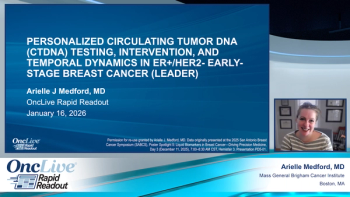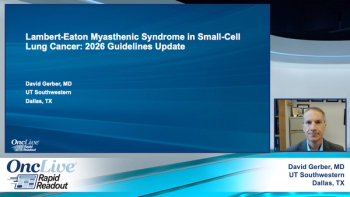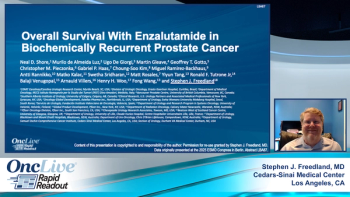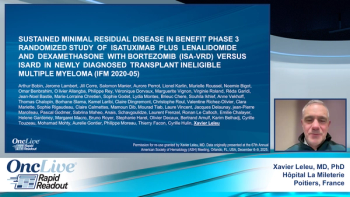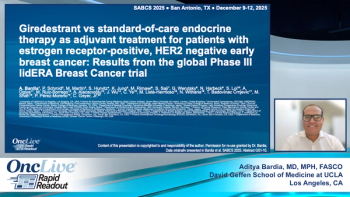
Rapid Readout: Phase 3 Trial (EPCORE DLBCL-1) of Epcoritamab Versus Standard of Care in Patients with Relapsed or Refractory Diffuse Large B-Cell Lymphoma (DLBCL)
Tycel Phillips, MD, discusses EPCORE DLBCL-1, a phase trial that focused on testing epcoritamab against other regiments for patients with relapsed or refractory diffuse large B-cell lymphoma, as presented at the 63rd ASH Annual Meeting in 2021.
OncLive® Rapid Readout from Phase 3 Trial (EPCORE DLBCL-1) of Epcoritamab Versus Standard of Care in Patients with Relapsed or Refractory Diffuse Large B-Cell Lymphoma (DLBCL)
Segment Description: Tycel Phillips, MD, discusses EPCORE DLBCL-1, a phase trial that focused on testing epcoritamab against other regiments for patients with relapsed or refractory diffuse large B-cell lymphoma, as presented at the 63rd ASH Annual Meeting in 2021. (
Segment Body Content:
- Patients (pts) with diffuse large B-cell lymphoma (DLBCL) who are refractory to or have relapsed (R/R) after treatment with chemotherapy and an anti-CD20 monoclonal antibody (mAb) have a poor prognosis. New treatment options are needed to improve outcomes.
- Epcoritamab, a novel, subcutaneously (SC) administered bispecific antibody, binds to CD3 on T lymphocytes and CD20 on B-cell non-Hodgkin lymphoma (NHL) cells to induce potent and selective killing of malignant CD20+ B cells.
- In an ongoing phase 1/2 dose-escalation trial in heavily pretreated pts with B-cell NHL (N=68), epcoritamab showed a tolerable safety profile and substantial single-agent antitumor activity, with a complete response (CR) rate of 38% and an overall response rate (ORR) of 88% in pts with R/R DLBCL (at 48-mg dose, n=8; EPCORE NHL-1 [NCT03625037]). Furthermore, all 4 evaluable pts with R/R DLBCL previously treated with chimeric antigen receptor T-cell (CAR-T) therapy achieved objective responses and 2 achieved CRs.
- These encouraging data support the potential for epcoritamab to improve clinical outcomes in pts with R/R DLBCL. Herein we describe the ongoing phase 3 trial of epcoritamab vs standard of care (SOC) treatment in pts with R/R DLBCL.
Methods
- EPCORE DLBCL-1 is a global, randomized, open-label, multicenter phase 3 trial designed to evaluate the efficacy of epcoritamab vs investigator’s choice of SOC with rituximab, gemcitabine, and oxaliplatin (R-GemOx) or bendamustine and rituximab (BR) in adults with R/R disease of one of the following CD20+ aggressive B-cell NHL histologies: (a) DLBCL, not otherwise specified, including de novo DLBCL or DLBCL histologically transformed from follicular lymphoma (FL); (b) “double- or triple-hit” DLBCL (high-grade B-cell lymphoma, with MYC and B-cell lymphoma [BCL] 2 and/or BCL6 translocations), including de novo “double- or triple-hit” DLBCL or “double- or triple-hit” DLBCL histologically transformed from FL; or (c) FL grade 3B.
- Other key eligibility criteria include: ≥1 line of prior chemotherapy that included treatment with an anti-CD20 mAb, Eastern Cooperative Oncology Group performance status 0–2, and prior failure of/ineligibility for autologous stem cell transplantation. Prior CAR-T therapy is allowed.
- Approximately 480 pts will be randomized 1:1 to receive either SC epcoritamab or intravenous R-GemOx (every 2 weeks, maximum of four 28-day cycles: 8 doses) or intravenous BR (every 3 weeks, maximum of six 21-day cycles; 12 doses of bendamustine, 6 doses of rituximab). Epcoritamab will be administered at the recommended phase 2 dose from the EPCORE NHL-1 trial in 28-day cycles (cycles 1–3: once weekly; cycles 4–9: every 2 weeks; cycle ≥10: every 4 weeks) until disease progression or unacceptable toxicity.
- The primary end point is overall survival. Key secondary end points include progression-free survival, ORR, duration of response, time to response, and safety.
- The study is currently enrolling in Australia, Austria, Belgium, Denmark, Finland, France, Hungary, Japan, the Netherlands, Norway, Poland, Republic of Korea, Singapore, Spain, Sweden, the United Kingdom, and the United States, and it will open for enrollment in additional countries (NCT04628494).


